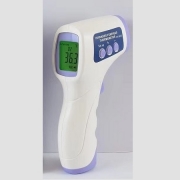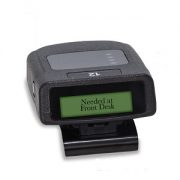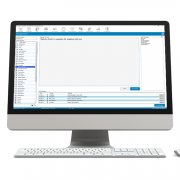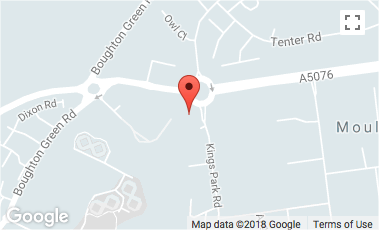Check Temperature With Forehead Thermometer
/in General Posts, Whats NewWith the advent of the Covid-19 pandemic checking the temperature of staff and visitors has now become commonplace in workplaces across the UK.
A normal body temperature does not mean that someone has not got the Covid-19 virus but a high temperature is along with other symptoms such as a new and consistent cough, loss of of or change to the sense of taste & smell is one of the indicators that caution should be advised.
We were asked by one of our large corporate accounts if we could source a reliable digital forehead thermometer for them to use across their estate of bars and restaurants, once we had sourced the best supplier for a medical grade infrared thermometer that had all the appropriate certifications we decided to offer this to all of our customers and managed to secure a large quantity to hold in stock.
The T-Scan Infrared Thermometer is now available to purchase online or for more information contact one of our team who will be happy to help.
Easy to use non contact digital infrared forehead thermometer for checking staff and visitors, the T-Scan Forehead thermometer checks body temperature to an accuracy of +/- 0.3c in one second.
Simple to use, just aim and press the trigger from up to 5cm from the forehead and the temperature is displayed on the large easy to read LCD screen.
- Non Contact Infrared
- 1 second fast measurement
- Three colour LCD back display (Green Normal, Amber Slightly High, Red High Temp)
- Accuracy +/- 0.3c
- Battery Operated (2 x AAA not included)
- CE & FDA Certified
COVID-19 – Cleaning Regime for Guest Pagers
/in General Posts, Whats NewAn effective cleaning regime for your guest pagers will help keep customers & staff safe during the Covid-19 pandemic. With the increased use of pagers to help manage customers waiting experience and promote social distancing we have received requests from a number of customers asking what is the best way to sanitise pagers.
Although all of our customer pagers have the added protection of antimicrobial additives in the casing it is still good practice to regularly clean pagers after each use.
We have put together this simple guide to add to your cleaning regime. You can download it here.
COVID-19 – Thermal Camera for Temperature Detection
/in General Posts, Whats NewWe have now received further stock of the PCS-UNT8504 Thermal Camera. This camera was originally sourced for one of our major account customers and is in high demand.
This is a professional grade but competitively priced camera for scanning body temperature when people enter your premises, the system can scan multiple people simultaneously with an accuracy of +/- 3 degrees C.
With a host of features including high temperature alerts, live view video, image capture, full report generating and an interface for connecting to our staff paging system it is the ideal solution to help protect staff and customers.
The camera is network connected and supplied with Windows operating software included.
Find out more on the dedicated web page here Thermal Imaging Camera.
COVID-19 – Patient Pagers Update
/in General Posts, Whats NewWe have received a number of requests for information on cleaning and sanitising patient pagers that we supply to hospitals.
Although our Patient Pagers that are used for calling waiting patients utilise ant-microbial additives in the plastics it is good practice to always clean the pager before and after use. Clinell Antimicrobial Hand Wipes & Clinell Universal and Sporicidal Wipes are proven effective against Covid-19 and are ideal for cleaning the patient buzzers before and after use.
You can read the latest information from GAMA Healthcare (Clinell) here click link
If your NHS Trust or clinic is looking for a solution to help with infection control and help manage your patient flow contact us and our experienced staff will advise on the most appropriate solution or read more about our patient call systems here.
COVID-19 Patient Waiting Areas Update
/in General Posts, Whats NewDue to the COVID-19 outbreak the government has issued advice to Business & Hospital Trusts to help maintain social distancing in the workplace & for keeping patients safe in hospitals.
Managing patient flow and ensuring that social distancing is maintained is challenging for busy hospital departments. Keeping patients safe in a busy outpatient department or clinic is a priority. Pager Call Systems has been supplying NHS Trusts throughout the UK with Quiet Call Patient Paging Systems to help during these challenging times.
With a patient call system for waiting areas patients can be kept safe by allowing them to move from the confines of the waiting area but still be called when their clinician is ready to see them.
Quiet Call Systems can be installed quickly and with a networked system the entire hospital site can be covered including nearby car parks if required.
If your NHS Trust or clinic is looking for a solution to reduce the numbers of patients who have to use your waiting rooms contact us and our experienced staff will advise on the most appropriate solution.
Circus Starr – Donate
/in General PostsPager Call Systems is pleased to be supporting Circus Starr again this year. Circus Star supports children with disabilities and families on low incomes and those facing challenges such as domestic violence, bereavement or who may be living with a life limiting condition.
Circus Starr enables these families to experience the fun of a world class show at the circus. We would encourage all businesses and individuals where possible to donate to this great charity.
www.circus-starr.org.uk
We hope that Circus Starr has another great year bringing joy to the people it supports.
NHS Told To Stop Using Pagers by 2021
/in General PostsThe Health Secretary Matt Hancock has said that he wants to stop the NHS using “outdated” pagers by 2021. In theory replacing pagers with WhatsApp style messaging is a good idea, but there are a number of drawbacks to using this technology.
First of all how exactly would replacing pagers with WiFi or network based data devices save money for the NHS? The NHS could not rely on staff using their own smartphones, this means the NHS would have to provide devices to all of their staff, the cost of supplying smartphones to staff would be substantially more than supplying pagers. There is the option of getting staff to use their own smart phones but this would bring in to question the confidentiality and security issues that surround the use of personal devices.
If the figures quoted by Matt Hancock are correct the NHS currently uses around 130,000 pagers at a cost of £6.6m per year, this equates to approximately £51.00 per year for each device. To replace all pagers in use with smart phone devices is likely to cost over £125 million, that is excluding the cost of software for the secure messaging platform and the increased infrastructure cost improving WiFi networks in hospitals to accommodate it.
Using App based messaging would rely on either a mobile phone networks data service or WiFi, many hospitals in the UK have very poor cell phone coverage withing the hospital and even ones that do have numerous black spots where there is no reception.
If the new devices were to use the hospitals WiFi network this would be reliant on not only excellent WiFi coverage but also very robust managed gateways with fast handover to ensure devices maintained connection whilst staff are on the move. Many hospitals just don’t have a good quality network that could support hundreds or potentially thousands of devices with instant handover between gateways.
The final issue is maintaining connection between the device and the WiFi network, even the best quality devices from time to time will lose their connection to WiFi.
Many hospitals have already installed new technology IP based communication systems only to find that the technology isn’t robust or reliable enough for a hospital environment.
Most people would agree that the NHS should be facilitated with the best technology available and correctly funded to instigate it but spending over a billion pounds on a project to replace pagers is unlikely to bring about the degree of improvements in care that would be seen from spending the money elsewhere within the NHS.
If the Department for Health and Social Care has over a billion in spare cash then ask the NHS where they would like that money allocated, I think there would be a long list of priorities above replacing pagers and fax machines.
At Pager Call Systems we supply both traditional paging systems along with network and WiFi based technology, in our experience pagers are still favoured by many hospitals due to there simplicity and reliability.
The questions that need to be answered before kicking the NHS pager in to touch are:
- Will the new technology to replace pagers cost the NHS more?
- Who is going to pay, the NHS Trust or the Department for Health and Social Care?
- Is the technology reliable enough?
- What benefits will the new technology bring?
Ultimately it will be down to cost and benefits and with a cash strapped NHS that is fast losing funding it is unlikely that the new technology will be affordable.
Unfortunately as has been shown many times in the past when government intervenes in things without first understanding the facts we can end up with a very expensive white elephant, lets hope this isn’t the case this time.
Connect LTM for Schools, Colleges & Universities
/in Customer Focus, General Posts, Whats NewConnect LTM provides site wide communication for schools & education facilities sending instant messages direct to pagers, mobile phones or email.
Providing instant communication with staff across the site Connect LTM ensures that staff can be contacted from any desktop PC with the ability to send messages to pagers, mobile phones via SMS or email no matter where they are located on your site.
As well as providing an efficient site wide communication system Connect LTM is a valuable addition to a schools lockdown protocol, schools and education facilities have recently become increasingly aware that an effective lockdown procedure is essential to maintain safety in the event of a critical incident. Connect LTM provides the opportunity to discretely & instantly communicate with all members or groups of members of staff informing them of events which could pose a risk to pupils & staff.
The Department for Education is currently looking to update its security guidance for schools to provide better information to help schools draw up effective security policies and plans. Whatever security and lockdown plan a site adopts an effective method of communicating critical events to staff is needed to ensure that staff are informed quickly and are provided with the information needed to take the appropriate remedial action.
If you would like to to find out more about improving your on site communication contact us on 0800 774 7320. You can find out more about Connect LTM here Connect LTM.
Loading Bay Safety
/in General PostsEnsuring employee safety in loading bay areas is a major priority for warehouse operators. This year there have been a number of high profile cases with Tesco being fined £1.6 million after a customer was injured in a loading bay incident at one of its stores, DHL being fined £2 million and Royal Mail £1 million.
Getting this wrong not only impacts companies financially it can be devastating and potentially life changing for anyone involved in the incident.
Most companies have clear written procedures to ensure workers safety when vehicles are reversing on to loading bays but moving vehicles on and off ramps in busy goods yards continues to be a dangerous environment for staff who are working in these environments. The Health & Safety Executive issues guidance expressing that “where possible the need for reversing should be eliminated” as part of its advice on safe manoeuvring. In practice it is extremely difficult to move vehicles on and off loading bays without reversing so keeping all workers clear of lorries being moved from holding areas to loading bays whenever possible will help reduce the risk of accidents.
Questions to ask when conducting a risk assessment for loading areas:
Where will goods be loaded & unloaded?
Who needs to be in the loading/unloading area – and who doesn’t?
Is there enough space around the bays for loading and unloading to take place safety?
Is the vehicle loading platform the same height as the loading bay platform?
What is visibility like for the drivers using the loading bay?
Could people fall from platforms or bays?
What are the risks of using dock shelters?
Is there an electrical risk associated with loading or unloading?
Have the people using the loading bay been trained to do so safely?
What systems are in place for calling vehicles and are staff trained to use them?
What can you do to keep staff away from vehicles?
DriverPage from Pager Call Systems is a system designed to improve efficiency and help protect workers by using on site pagers and tablet based call systems to alert a driver when they are required to move a vehicle on to a loading bay, the system eliminates the need for any staff to physically go to a vehicle to ask the driver to move on to the ramp.
With DriverPage a vehicle can be booked on to the system when coming on to site, the driver is given a pager and sent to a holding area then alerted via the pager with the loading bay displayed on the pager when they are required, using DriverPage ensures that the vehicle is only moved when needed without any staff having to walk around busy areas to tell drivers where to go.
Using DriverPage also offers the opportunity to remove vehicle keys to ensure a vehicle isn’t moved off the loading bay until authorised allowing the driver to be called to collect keys and move the vehicle when its safe to do so.
The DriverPage system also provides management reports showing how long a vehicle was held on site and when they were called to a bay and cleared off site. DriverPage not only helps improve staff safety it provides a faster more efficient way to move vehicles on site.
Companies wanting to know more about the DriverPage system can contact Pager Call Systems on 0800 774 7320 or visit their website to find out more at www.pagercall.co.uk.
Latest News
 PCS Joins The BTG Family26th February 2026 - 1:17 pm
PCS Joins The BTG Family26th February 2026 - 1:17 pm Andon Digital Alert: Revolutionising Production Communication12th February 2025 - 1:53 pm
Andon Digital Alert: Revolutionising Production Communication12th February 2025 - 1:53 pm Deep Dive Discussion on Ultra-Trac RFID Table Tracking18th December 2024 - 3:10 pm
Deep Dive Discussion on Ultra-Trac RFID Table Tracking18th December 2024 - 3:10 pm
Contact Us
Unit 21 Babbage House
Northampton Science Park
Moulton Park Industrial Estate
Northampton NN3 6LG
t: 0800 774 7320
f: 0845 6444108
e: enquiries@pagercall.co.uk













